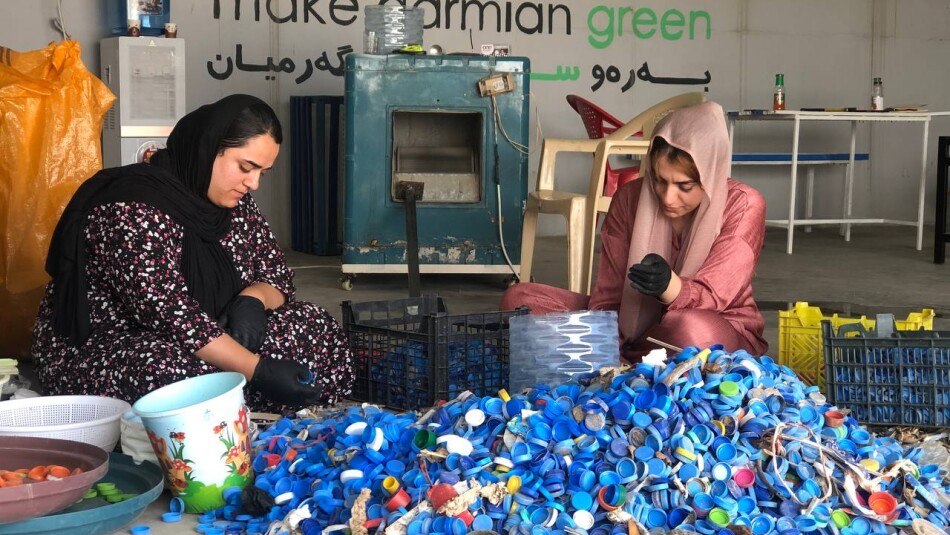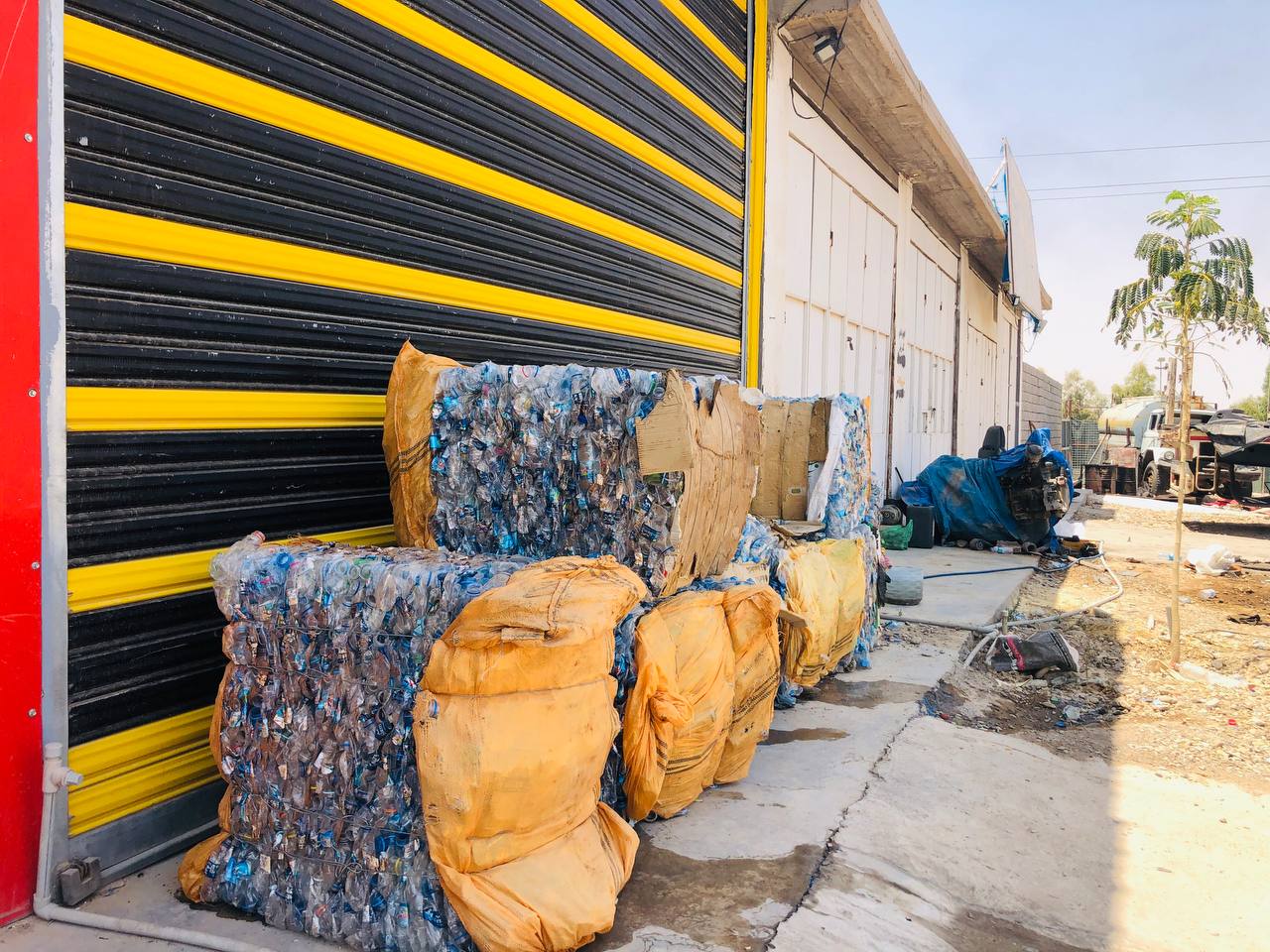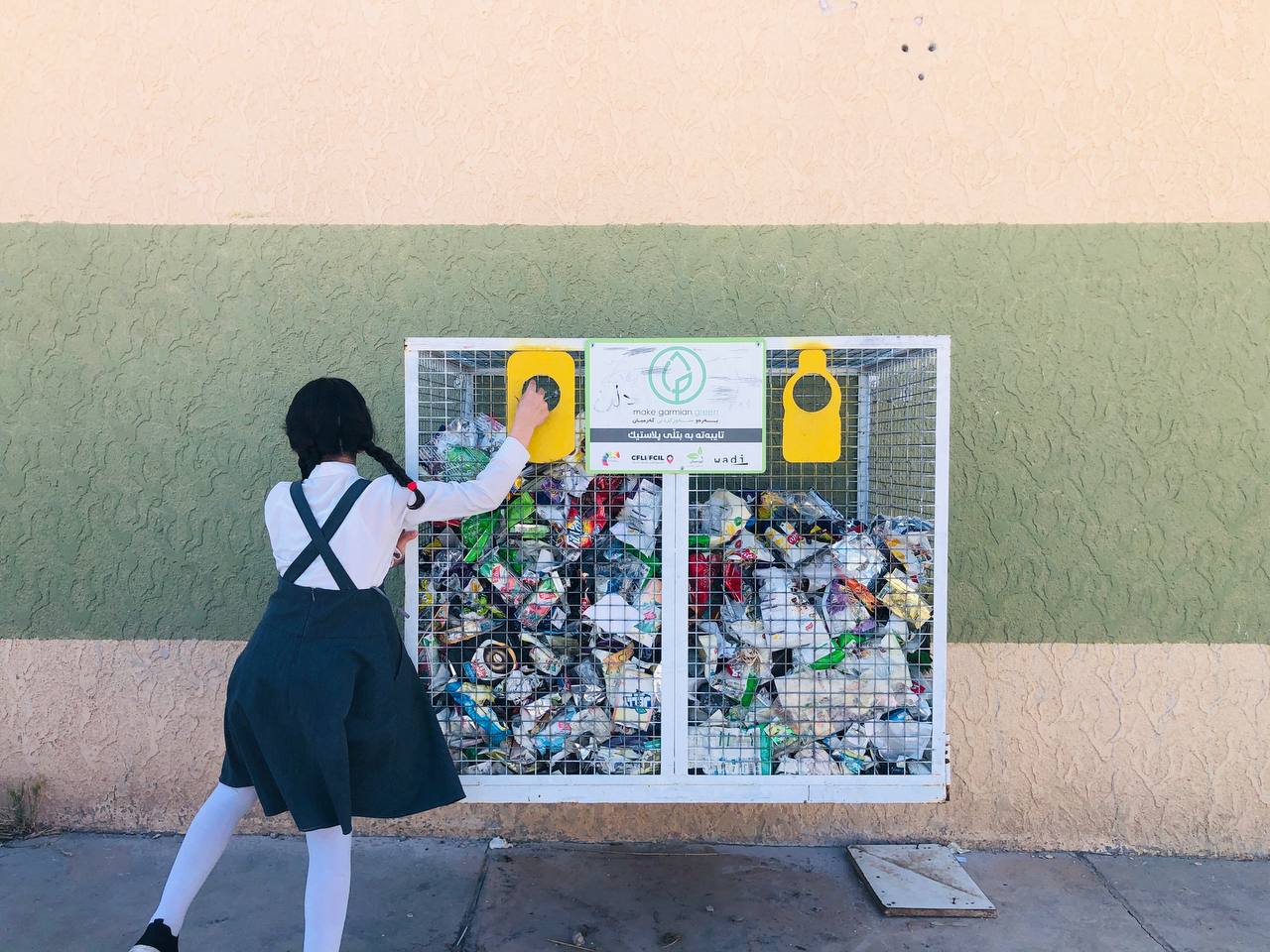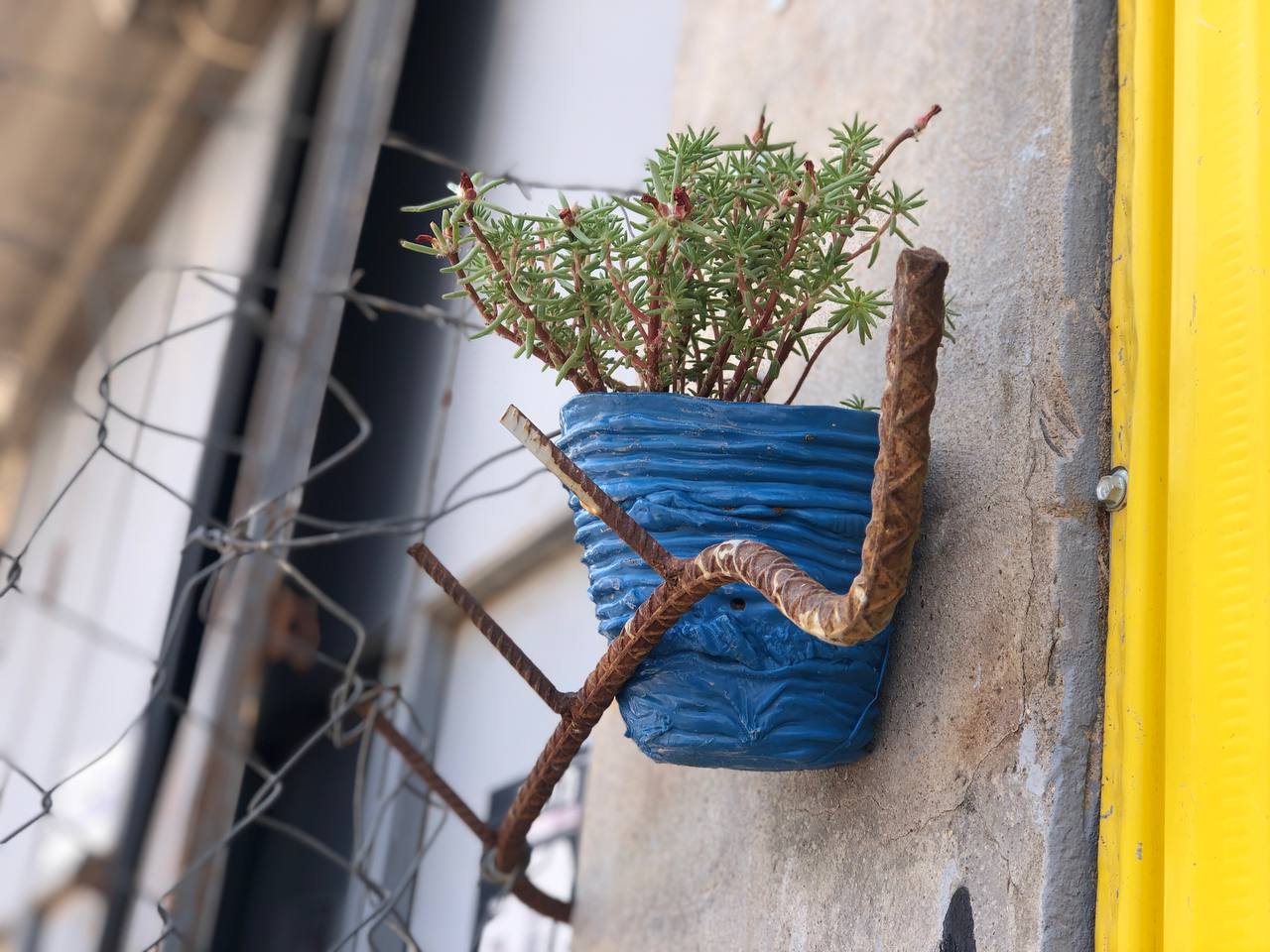
They collect plastic bottles and waste and reuse them to make daily household needs instead of becoming a curse that threatens the environment and the health of people.
The initiative was launched from Garmyan, specifically in the Kifri district, through a small factory for recycling plastic waste. The factory grinds and melts no less than 50 kilograms of plastic daily, which is turned into chairs, tables, flower pots, and more.
"I started collecting plastic from my home and brought it to the factory," says Sheni Hashem, who works with three others in the same factory, which is of a 120-square-meter house, through which they perform a service to the environment and provide a source of income for their families.
About 500 tons of waste are collected daily in the Garmyan administration, without being sorted, but it is estimated that this waste contains large quantities of plastic in the form of water bottles, cleaning materials bottles and other materials made of nylon.
The collection of plastic waste has begun to spread in Garmyan, and many projects and initiatives have been launched through small factories with primitive equipment in which plastic is recycled, in addition to providing job opportunities for young people, including the Omid Ali initiative.
Young people do not leave a bottle thrown on the street and bring it directly to us
"We have had an impact on cleaning the environment... young people do not leave a bottle thrown on the street and bring it directly to us," says Omid Ali, who is only 16-years-old, but from the way he spoke about the project he seemed like a person with experience in the field.
Plastic is harmful to human health, affects fertility, hormonal activities and the brain, and if burned, it pollutes the air, according to warnings from the United Nations, which indicated in its statistics that 400 million tons of plastic materials are produced daily, half of it are disposable and less than 10% are recyclable.
A simple solution to a complex problem
The plastic recycling plant in Kifri was established with locally made equipment, except for some rare equipment that was imported. The project was established with the support of non-governmental organizations NGOs.
The cost of establishing the plant was $15,000 American dollars, funded by the organizations (Wadi) and (BMZ). Preparations for its establishment began in late 2022, and now the organization (Adwi) has also become a partner in the project.
"We compress 50 kilograms of plastic bottles of water, shampoo, and oils every day, and we sell one ton of it for 140 dollars," Sheni Hashim says.
Part of the plastic waste is recycled and made into chairs and tables, waste containers, and flower pots, after boiling it at high temperatures so that it is not harmful to the health of the consumer.
Kifri residents from different segments and categories collect plastic waste and bring it to the Kifri plant, especially school students, where iron baskets have been allocated to collect waste and encourage them to preserve the environment.
Everyone uses plastic and does not know that it is harmful to the environment and health
"The amount of plastic collected daily has increased, and there is a great demand in schools and kindergartens for the products of the Kifri factory," according to Sheni, who started from her home and now all her firends and relatives help her collect plastic.

Plastic water bottles turned into pallets to be turned into household plastic products, Garmyan, 2024. KirkukNow
The population of Kifri district is estimated at 55,000. The district is affiliated with the Garmyan administration of Sulaymaniyah Province, which also includes the districts of Kalar, Darbandikhan, dozens of sub-districts and hundreds of villages. The total population of the Garmyan administration reaches 324,000 people, according to previous statistics obtained by KirkukNow from the Garmyan Statistics Department.
Ali has provided permanent employment opportunities for two workers by establishing the factory.
“We grind the plastic and send it to Iran, where it is converted into fibers used in the manufacture of home furniture,” Ali says.
There are no similar factories in Iraq, so they have to export the raw materials to Iran.
There are three machines for grinding plastic in Kalar disrict, next to Kifri, two of which are called “grinder”, the machine is one and a half meters wide and four meters high and is used to grind plastic boxes, jerrycans (fuel storage containers), detergent containers and plastic buckets. The other machine, which is 10 meters high and two meters wide, is responsible for compressing water bottles.
The United Nations UN has drawn up a map to reduce plastic pollution in the world by 80% by the year, through three market transformations.
First, promoting reuse benefits including refillable bottles, second, recycling plastic materials in factories and making other products from them, and third, redirecting and diversifying by carefully replacing products such as plastic wrappers, bags and ready-made products with products made from alternative materials such as paper or biodegradable materials.
Sabah Muhammad, installed a plastic grinding machine in Garmyan, the machine is of the threshing type and two workers collect plastic waste for it, after grinding 200 to 400 kg of plastic daily it is exported abroad.
"I was the first to bring the machine to Garmyan. If we do not collect plastic waste, the city would be filled with plastic waste."
The recycling plant in Kifri is distinguished from others in that it grinds plastic and turns it into products and is the second experiment of the (Wadi) organization, as it previously implemented a similar project in Halabja, and after that Kifri district, it implemented another project in a camp for the internally displaced persons IDPs in Dohuk Province.
Bakhan Jamal, director of the Adwi organization and supervisor of the Wadi organization’s projects, says that the establishment of the factory in Kifri is due to “the absence of services and the neglect of the district, as it is one of the disputed areas between the government and the Iraqi and the Kurdistan Regional Government, which caused severe environmental damage."
There are seven types of plastic, some of which are not suitable for reuse due to the emission of toxic gases from them when heated or boiled. Bakhan Jamal says that the factory uses plastic materials of the type (TET) and (HDPI), as they are recyclable.
Environment breathes a sigh of relief
Plastic waste recycling projects have had an impact on the environment. In the absence of these factories, plastic waste is mixed with other waste and then disposed of either by burying it or burning it, both methods are harmful to the environment and health.
About 500 tons of waste are collected daily in Garmyan, 30 of which are in Kifri.
"Everyone uses plastic without knowing its harm to the environment and health. 25 to 30 tons of waste is collected, dilay which contains plastic and is buried outside the district center,” said Ali Khurshid, Kifri Municipality Director.
Khurshid praised the plastic waste recycling project in Kifri and said, "We consider it a very important project and support it because plastic plastic bottles have destroyed our city."
Plastic waste is collected from schools, houses and other places and is transported to the Kifri factory and other projects for grinding plastic.
The director of the (Adwi) organization pointed out that 18 boxes were set up to collect water bottles in schools, gyms and public places.
"After that, the plastic waste is transported to the factory, and we have also allocated 10 boxes in schools and public places in Kalar district. If the plastic is not sold in Kalar, it is transported to the Kifri factory."
One of the project's goals is to create a relationship between schools, gyms, public places, government departments and restaurants.
"We want to connect these parties with each other and become a bridge of communication between them in order to cooperate to protect the environment."

"Environmental education is one of the most important aspects of the project, because it focuses on educating children from a young age to avoid using plastic materials and know its harms and how to recycle them," Jamal says.
Kifri Plastic Waste Recycling Plant has organized awareness campaigns in 30 schools and its activities are still ongoing with the aim of delivering its message to nearly 100 educational centers, from kindergarten to middle school.
According to statistics from the United Nations Environment Program (UNEP), one million plastic packages are purchased every minute, while up to five trillion plastic bags are used worldwide each year. In total, half of all plastic materials produced are designed for single-use purposes.
Despite the small size of the factory run by Ali, it attracts many people and provides them with profits.
“I receive plastic waste every day on three-wheeled motorcycles. We have made young people keen to pick up any plastic container thrown in the streets, and in return they earn some money.”
The director of the Kifri municipality hopes that the Kifri plastic recycling factory will encourage people to collect plastic waste not only in schools but also in neighborhoods and alleys.
“I would love it if special boxes were placed so that the plastic does not mix with the rest of the waste.”
High hopes and limited support
Ali hopes to expand his factory and plans to install special equipment to convert plastic granules into fibers instead of sending them to Iranian factories, but this requires a larger area and expansion.
The land Omid Ali owns in Kalar is three dunams (0.3 hectares) and is not enough to establish a larger factory.
“The government does not help us by securing a larger plot of land.”
Sabah Mahdi, who runs a similar factory, also suffers from a lack of support. “The government does not support us and does not let me expand my factory.”
This comes while the KRG has stressed in its program to work on protecting the environment and spreading environmental awareness, in addition to developing advanced systems for recycling and waste management and treatment.
Diyar Ali, the head of the finance department at the German Cooperation Foundation, says, "Kifri is being neglected and needs more work in the field of environment. The government and the municipality do not care and do not have plans to reduce environmental pollution with plastic.”
“We planted a large number of trees, but the municipality does not take care of them." Diyar suggests that the Kifri factory's boxes to be installed in public parks and other facilities.
Statistics from the United Nations indicate that millions of tons of plastic pollute the environment through burial or burning, and plastic waste costs the global economy between 80 to 120 billion dollars annually.
"It is true that the Education Directorate cooperates with us and allowed us to place plastic collection boxes inside schools. The municipality and education are convinced of the importance of the factory, but they do not have any major initiatives yet." Jamal says. She believes informing people about the importance of the project and recycling plastic waste takes a lot of time.

The project has not yet reached the stage of making profits because the expenses so far exceed the revenues.
The director of the (Adwi) organization says, "The items that we manufacture in the Kurdistan Region sometimes take a whole year to produce, and securing customers who offer reasonable prices for recycled plastic products is difficult.”
“In addition to that, separating plastic from other types of waste has not yet become a culture followed among our citizens."
The project has not yet reached the stage of making profits because the expenses so far exceed the revenues.
Competing for the environment
It has been six years Amina Abdullah, a 56-years-old lady in the Shahidan neighborhood in Kalar district has not thrown away any plastic waste. If she has to use plastic, she collects it in a place and calls a young man every month or two to transport the plastic waste from her home to the grinding plants.
Abdullah sends Plastic waste to the factories to be crushed. "I heard a lot about the harms of plastic, I rarely use it so as not to pollute the environment because it will affect my health and the health of my children."
She is currently spreading awareness as an environmental activist, starting with her children.
"I have two married daughters, I also told them that they should collect plastic waste and contact the same person to take it to the factories."
She believes that the presence of plastic grinding factories is necessary to avoid throwing plastic waste randomly.
"The young men compete over who collects the largest amount of plastic waste and brings it to us, after the alleys and surroundings of the shops were previously filled with plastic waste," according to Ali.
The iron boxes that were installed in the schools by the Kifri factory are quickly filled with plastic water bottles and have become a source of inspiration and awareness to implement this step inside and outside the home.
Aram Mohammed Baban, principal of Hataw Elementary School, said, "At first, it was difficult to make 659 students understand the dangers of plastic and environmental awareness, but environmental awareness has increased day by day."
For more than a year and a half, a special team from the Kifri Project has been giving environmental seminars to students at Nawroz Elementary School. The school's principal, Miqdad Fuad, says that this step "has had a positive impact on the students. The first waste collection box was installed in our school."
"If it weren't for these factories, the area would be filled with waste. I collect plastic waste from shops and streets every day with a number of other young men and take it to the factories... With this work, we clean our city and earn some money," says Ahmed Amjad, 30, who lives in Kalar and collects plastic daily.
In 2020, the Kurdistan Region's High Authority for Environmental Protection banned the use of plastic water bottles within its premises and its affiliated departments, but the procedures for implementing the decision and the penalties for violating it are unclear.
Raouf Omar, a restaurant manager, put a plastic collection box in front of his restaurant. The boxes fill up in a short time.
“We collect about 3,000 plastic bottles every week, which are then transported by one of the factory workers. "passing people keep putting water bottles in the box," Raouf said, hoping the project will expand to include other areas.